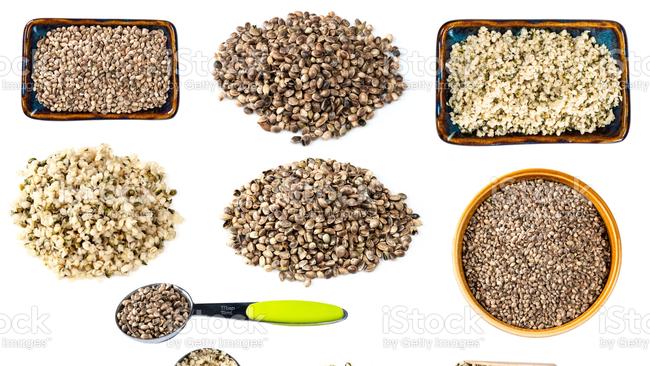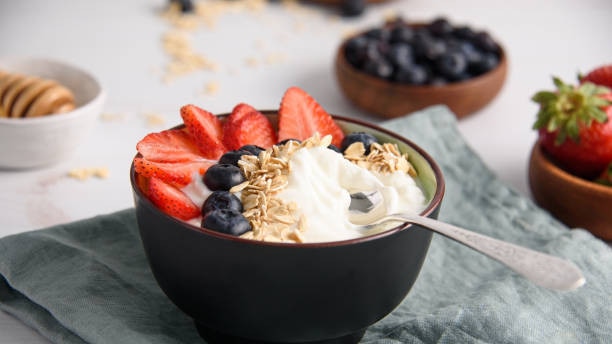Eight simple health hacks for the over 40s
Setting yourself extreme health and fitness goals for 2022 is going to end only one way. Target achievable health hacks that will make a long-term difference.

Setting yourself extreme health and fitness goals for 2022 is going to end only one way. If you haven’t already fallen short of punishing new year expectations it’s likely that you will by the end of the month, when motivation wanes. From middle age onwards a more realistic aim is to target achievable health hacks that really will make a long-term difference, to stem the spreading waistline and niggling wellbeing concerns. Here’s our pick of the bunch.
Eat two tablespoons of seeds every day
If you’re going to add one thing to your diet in 2022, make it more seeds. They will provide plenty of gut-friendly fibre (important for digestion) along with plant protein, minerals and phytonutrients that are linked to a host of health benefits. The list of gains is endless, but sunflower seeds contain phosphorus and manganese for bone health, pumpkin seeds are a source of zinc and phytochemicals shown to improve prostate and urinary health, and sesame seeds contain magnesium and vitamin E, important for preventing furring of the arteries. Get a mix of as many as you can.
More evidence that they are a good daily addition came in the form of two recently published papers. A British Medical Journal review of 41 studies involving about 1.2 million adult participants that showed a high consumption of alpha-linolenic acid - an omega-3 polyunsaturated fatty acid - found in seeds (as well as nuts and plant oils) was associated with a 10 per cent lower risk of death from all causes and an 11 per cent reduction in coronary heart disease.
Women who eat seeds were found to be at a 7 to 15 per cent reduced risk of non-alcoholic fatty liver, a condition that occurs when fat builds up in the organ and which affects up to 30 per cent of the global population. Researchers from Deakin University showed that for men there was a 9 per cent lower prevalence of the condition in those who ate a couple of tablespoons of seeds a day compared with those who ate fewer of them.

Have a daily dollop of yoghurt
It deservedly has a reputation as the go-to food for your gut health thanks to the beneficial bacteria it contains, but eating plain yoghurt every day could improve your health in other ways. Dr Alexandra Wade, a nutrition researcher at the University of South Australia, showed that the live bacteria in plain yoghurt help to promote the release of proteins that can help to lower blood pressure. They work in conjunction with micronutrients - including calcium, magnesium and potassium - that boost bone strength and are also involved in the regulation of blood pressure.
Wade showed that just a small carton of plain yoghurt (150-200g) every day helped to lower blood pressure in middle-aged adults with hypertension. “Yoghurt is a very healthy addition to the diet,” she says. “In our latest trials we showed that the more regularly you eat it the better, with blood pressure readings nearly seven points lower in those who ate some yoghurt every day than in those who never consumed it.”
Go to sleep without a tracker
Most of us suffer more sleep problems from our forties onwards, with changes to hormones that govern circadian rhythms meaning our sleep patterns change or are interrupted. Sleep trackers, which work by monitoring body movements as you sleep to determine how much time you probably spent awake, or by tracking heart rate changes to estimate how much time you spent in each sleep cycle, promise to make midlife sleep more restful, but might actually make matters worse.
By comparing them with polysomnography tests used to diagnose sleep disorders, researchers have estimated that sleep trackers are only 38 per cent accurate in determining when you drop off, and 78 per cent accurate in telling whether you are asleep or awake.
Meanwhile, University of Oxford researchers have shown that for patients with chronic insomnia a preoccupation with tracking sleep causes anxiety and low mood over sleep loss, which causes more sleeplessness. “None of the different manufacturers’ devices uses precisely the same formula to come up with a sleep score, making the data largely meaningless,” says Dr Neil Stanley, an independent sleep scientist. “You will probably sleep better without one.”
Don’t nibble late at night
Whether you call it time-restricted eating or have a less lofty label for curtailing your evening calories, the outcome is likely to be beneficial for preventing those pounds from creeping on after your mid-forties. After a 2020 study published in the Journal of Clinical Endocrinology & Metabolism suggesting that “eating a late dinner worsens glucose tolerance and reduces the amount of fat burnt”, potentially causing weight gain, comes a new paper that shows how night-time eating raises blood glucose levels - a risk factor for diabetes - by 6.4 per cent. Restricting meals to the daytime prevented this adverse outcome.
According to the team from Harvard Medical School and the Medical Chronobiology Program at Brigham & Women’s Hospital in Boston, Massachusetts, eating late at night triggers mistiming between the central circadian body clock, located in the brain’s hypothalamus, and behavioural fasting/eating cycles that play a key role in boosting glucose levels.

“This study reinforces the notion that when you eat matters for determining health outcomes such as blood sugar levels,” says Dr Sarah L Chellappa, a co-author of the paper published in the journal Science Advances. To be on the safe side eat your last main meal by 6pm or 7pm and limit late-night snacking.
Pop a vitamin D supplement
If you are late to the party with vitamin D supplementation, there are yet more reasons to take it besides the fact that it boosts the health of ageing bones, joints, teeth and muscles. UK Biobank data shows that 55 per cent of us have low levels of vitamin D (
Using data from the UK Biobank for their study in the European Heart Journal, researchers at the University of South Australia found that people with vitamin D deficiency were more likely to suffer from heart disease and higher blood pressure than those with normal levels of vitamin D as determined by a blood test. According to Professor Elina Hypponen, the director of the Australian Centre for Precision Health and the lead author of the paper, people with the lowest vitamin D levels were at more than double the risk of heart disease than those who had enough.
“If we don’t get any vitamin D through the sun, this is one of the rare nutrients for which we sometimes need to take a daily supplement to keep up with the requirements,” Hypponen says. “Our results are exciting as they suggest that if we can raise levels of vitamin D within norms, we should also affect rates of cardiovascular disease.”

Aim for 1000 extra steps in a day
If a 10,000 daily step total is too much of an ask, try to tot up at least an extra 1,000 steps a day than you are managing at present. Researchers at the University of North Carolina analysed the daily step patterns of 16,732 women who wore pedometers to track their activity levels. Findings, presented at the American Heart Association’s 2021 Epidemiology, Prevention, Lifestyle and Cardiometabolic conference, found that, compared with no daily steps, each initial increase of 1,000 steps a day was associated with a 28 per cent reduction in death during the four-year follow-up period. Participants who took more than 2,000 daily steps in uninterrupted bouts had a 32 per cent decrease in risk of death.
Even short bursts of walking brought benefits with women taking regular ten-minute walks throughout the day living longer than those who did nothing. “Every minute you are active is infinitely better for your health than a minute sitting down,” says Greg Whyte, a professor of applied sport and exercise science at Liverpool John Moores University. “Set yourself achievable step targets this year and go for them.”
Aim for a 3:2 daily ratio of veg to fruit
Despite an upturn in consumption of fruit and vegetables during the pandemic lockdowns with 2021 research at King’s College London showing that 33 per cent of British adults increased their consumption from 3.5 to 5.6 portions a day, most of us still don’t eat enough of them. Our target, according to research involving nearly two million adults that was published in the American Heart Association’s journal Circulation, should still be a total of 5 daily servings, but specifically a ratio of 3:2 vegetables to fruit to get the fibre and nutrients we need.
Any increase might be particularly important from middle age onwards to help reduce risk for a long list of chronic health and medical conditions, to which dementia has now been added. Last year Harvard researchers looked at data on 49,493 women with an average age of 48 and 27,842 men with an average age of 51 at the start of their study published in Neurology journal. They found that middle-aged people with a diet rich in flavonoids, the chemicals that give plant foods their bright colours, may have an average 20 per cent lower risk of cognitive decline. Eating flavonoid-rich fruit and veg including strawberries, oranges, peppers, celery, grapefruits, apples and pears might help prevent the forgetfulness and mild confusion that often occurs with advancing age.

It’s never too late in life to start making amends. “We saw protective relationships whether people were consuming the flavonoids in their diet 20 years ago, or if they started incorporating them more recently,” says Walter Willett, professor of epidemiology and nutrition at Harvard and the study author.
Embrace the ten-minute run
Running remains one of the best things you can do for cardiovascular fitness and health, and even orthopaedic surgeons agree that, provided you don’t overdo it as you get past 35, you can carry on running and not end up with knackered knees by your sixties, seventies or beyond. For the middle-aged and older the key is to reduce duration and increase intensity (if you can) - in other words, aim for a better performance with minimal joint pounding.
According to researchers at the University of Tsukuba in Japan, even a ten-minute run is beneficial for mental wellbeing. When running, neuronal activation in the brain is boosted so that we can co-ordinate our bodies, balance and accelerate as we move. This process increases blood flow to the brain’s bilateral prefrontal cortex that controls mood and, after a ten-minute run, participants reported feeling more positive and focused about what lay ahead.
The Times





To join the conversation, please log in. Don't have an account? Register
Join the conversation, you are commenting as Logout